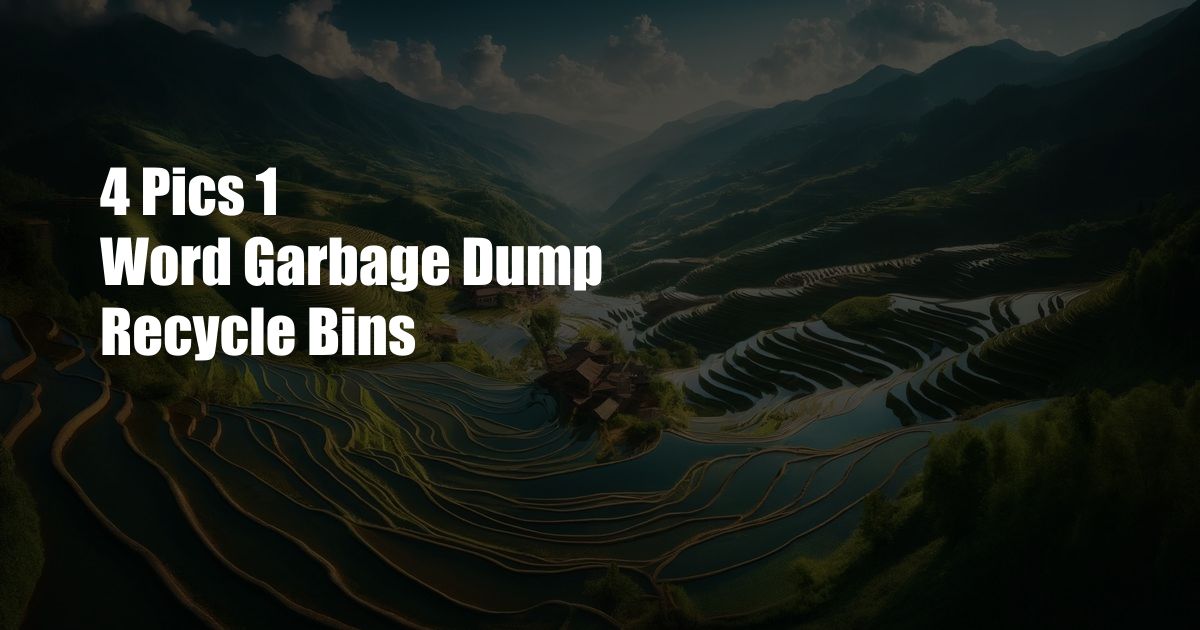
4 Pics 1 Word: Decoding the Enigma of Garbage Dump Recycle Bins
A Tale of Trash and Transformation
Picture this: you stumble upon a scene at a local park – four images flash before your eyes, seemingly unrelated. A sprawling garbage dump, towering recycle bins, a lone tree, and a vibrant recycling symbol. As you ponder their enigmatic connection, a single word emerges from the depths of your memory, like a beacon illuminating the puzzle: “environment.”
The Intersection of Waste and Sustainability
The interplay of garbage dumps and recycle bins encapsulates the pressing issue of waste management and its profound impact on environmental sustainability. These polarizing symbols represent the two extremes of our relationship with waste: disposal and recovery.
Unveiling the Garbage Dump
Garbage dumps, often referred to as landfills, serve as the final resting place for non-recyclable waste. They are repositories of our discarded materials, from household trash to industrial byproducts. While necessary for waste disposal, landfills pose significant environmental challenges, including methane emissions, groundwater contamination, and habitat destruction.
Exploring Recycle Bins
In stark contrast, recycle bins provide a path towards responsible waste management. They collect recyclable materials such as paper, plastic, glass, and metal, diverting them from landfills. By recycling, we reduce our consumption of raw materials, conserve energy, and mitigate greenhouse gas emissions.
The History and Significance of Recycling
Recycling has its roots in ancient times, with evidence suggesting that early civilizations reused and repurposed materials for various purposes. However, organized recycling programs gained prominence in the late 19th century as concerns over waste accumulation and resource depletion grew.
Today, recycling plays a vital role in sustainable waste management practices. It helps conserve natural resources, reduce pollution, and promote economic development through job creation and resource recovery industries.
The Importance of Environmental Awareness
The juxtaposition of garbage dumps and recycle bins serves as a stark reminder of the significant impact our actions have on the environment. It underscores the need for increased environmental awareness and responsible waste management practices.
By reducing our consumption, embracing recycling, and supporting sustainable initiatives, we can collectively mitigate the environmental degradation caused by waste disposal and contribute to the creation of a more sustainable future.
Tips and Expert Advice for Responsible Waste Management
Reduce, Reuse, Recycle
The “3 Rs” of waste management – reduce, reuse, recycle – provide a comprehensive framework for minimizing waste generation. Reduce consumption by opting for reusable items, repair broken items instead of discarding them, and avoid single-use products.
Identify and Segregate Recyclables
Familiarize yourself with the types of materials accepted by your local recycling program. Properly segregate recyclables from garbage to ensure efficient recovery and prevent contamination.
Compost Organic Waste
Composting food scraps, yard waste, and other organic materials reduces waste sent to landfills and creates a nutrient-rich soil amendment for gardens.
Frequently Asked Questions (FAQs)
Q: What items can I recycle?
A: Common recyclable materials include paper, plastic (check for recycling symbols), glass, metal, and cardboard. Contact your local recycling program for specific guidelines.
Q: Why is recycling important?
A: Recycling conserves natural resources, reduces energy consumption, diminishes greenhouse gas emissions, and promotes economic development.
Conclusion
The enigmatic connection between garbage dumps and recycle bins highlights the critical importance of responsible waste management. By embracing sustainable practices, reducing waste generation, and actively engaging in recycling, we can create a cleaner, healthier, and more sustainable environment for generations to come.
Are you interested in learning more about waste management and recycling practices? Join the conversation and share your thoughts on this topic!
 Azdikamal.com Trusted Information and Education News Media
Azdikamal.com Trusted Information and Education News Media